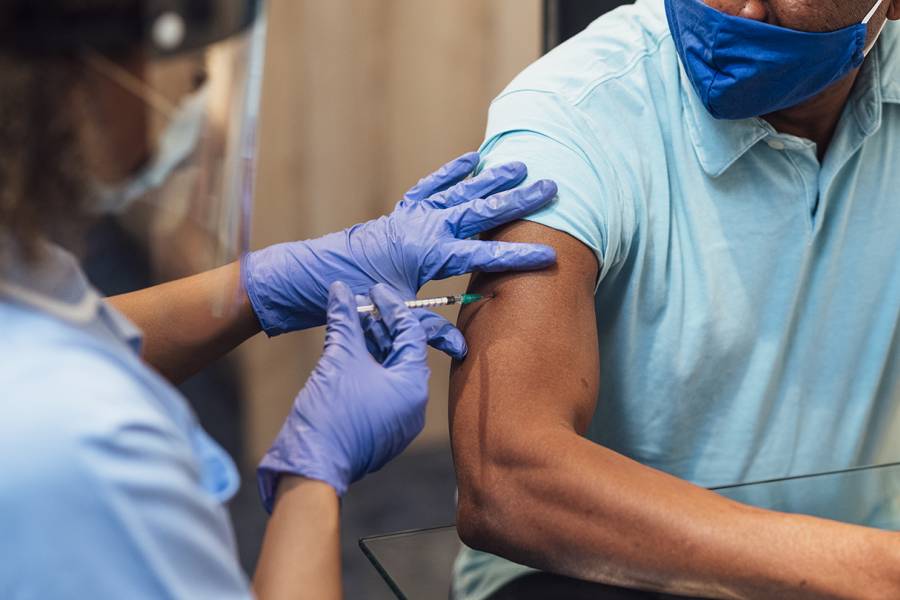With the spread of COVID-19 variants and the possibility of vaccinated individuals acting as asymptomatic carriers, there is still much uncertainty about when and how the pandemic may come to a close. As more Americans are vaccinated, questions have arisen about best practices for the newly vaccinated and for those who have yet to receive their shots. While guidance from the U.S. Centers for Disease Control and Prevention emphasizes the importance of caution, Monica Gandhi, an infectious disease specialist from the University of California at San Francisco, says there is a lot to be hopeful about in the near future.
Last month, Public Health on Call, a podcast from the Bloomberg School of Public Health, hosted a conversation between Gandhi and Joshua Sharfstein, vice dean for public health practice and community engagement at the Bloomberg School of Public Health. Together, they discussed the short- and long-term effects vaccinations will have on the pandemic, and when we might be able to expect a return to normalcy.
When you look at what's going on with vaccines are you filled with optimism, or are you filled with concern, given, for example, the variants and some of the issues about whether vaccines could soon be rendered obsolete by mutations in the virus?

Image caption: Monica Gandhi, professor of Medicine at the University of California
I am filled with incredible optimism because I keep on thinking that we got to these vaccines really quickly in comparison to any other pandemic. So March 11, WHO said this is a pandemic. November 9, we got the first press release of a safe and effective vaccine from Pfizer, and we've just been getting press release for publication, since now, of seven vaccine candidates. I am really, really hopeful and optimistic that these vaccines will get us through the pandemic.
Let's talk about the basis for your optimism. So one reason for your optimism is the results from the large clinical trials?
Yes, one reason for my optimism was really across all six phase III clinical trials. Let's just focus on one outcome here, the outcome that landed us into trouble with COVID-19 to begin with, which is that it can cause very severe death, very severe disease and death. And essentially, let's look at hospitalization alone: that across all six trials, essentially there was almost 100% protective efficacy against getting hospitalized if you received the vaccine.
If you looked at severe disease, which was defined as a subset of those who got hospitalized but also some people who just didn't feel well at home. [They] still prevented almost all of severe disease, all six vaccines. And then mild disease, there were definitely differences in the outcomes. But what scares us the most is severe disease and I was extremely excited by the consistency of those findings across all the trials
And there's also evidence that beyond the clinical trials, these vaccines have an impact on severe disease, is that right?
Yes. ... So Israel has a deal with the Pfizer company that it is only rolling out that particular vaccine, and it's doing it fast. At this point, almost 95% of everyone over 60 years old has been vaccinated in Israel with the Pfizer vaccine, and hospitalization rates in that community are almost down to zero. Literally, there are few people in the hospital who have been fully vaccinated.
And also importantly, cases have decreased. Because there is still swabbing of those patients over 60, cases are very low in those who have had excellent rollout of the vaccine. The same thing is being seen in the UK to a lesser degree, because they haven't gotten to quite those numbers. But we are seeing in the United Kingdom that even after one dose, the Pfizer vaccine had 67% reduction in both asymptomatic and symptomatic cases.
So let's talk about that for a second. It's obviously tremendously great news that there's a major reduction in hospitalizations and deaths, but then we hear that there could still be transmission. How do you think about that, that somebody who's vaccinated could pick it up and maybe give it to someone else?
So that statement—that there still could be transmission—is being made in an abundance of caution, meaning the vaccines were not designed, trials were not designed to swab everyone every week, at least most of them did not do that. And so you couldn't tell if asymptomatic infection, right off the bat, was decreased by these vaccines.
And we don't actually have a precedent for this with other vaccines like measles, for example, because we never did this degree of screening for asymptomatic infection. So it's out of an abundance of caution it's being said. However, there are four biological reasons why we think they are going to reduce transmission, and we're seeing data already that they're reducing transmission.
The four biological reasons are that vaccines actually do stimulate IgG antibodies—they all measure that—and IgG antibodies go in your nose, which is where you get asymptomatic infection. So they will block asymptomatic infection there. Vaccines also stimulate IgA, which is the immunoglobulin that goes in your nose, and we don't measure that in the trials but vaccines all do that. Third is that the monoclonal antibodies that we use, that we've been using for outpatient therapy, actually do decrease viral load all the way from the nose all the way down to lower respiratory tract. And then finally, in the macaque studies of all of these vaccines, when you gave macaques vaccine and you swab their nose, they had low or no viral loads in their nose.
And then we have some real world data from the UK and Israel that viral loads are decreased massively, fourfold, after giving a vaccine. We're seeing cases go down in the real world studies with vaccines. And so I think it's sort of an abundance of caution to say it, but they are going to reduce transmission and we should feel very optimistic about that.
How do you fit the variants of the virus into this picture? Because there are definitely some people out there going, 'Wait, wait, wait, we could need strain changes, we could need regular updates in the vaccines.' There's been some data, particularly for that other variant from South Africa, that maybe certain vaccines are not so successful against that. How do you put that into this picture?
I think there are two ways to think of the variants. I want to break them down in severe and mild disease and then wonder at their impact. So these variants, of course, were expected in the sense that RNA viruses just don't have the proofreading mechanism as DNA viruses. They're going to mutate, and there was so much transmission, there was so much going on this last surge, that they can mutate. So they are happening. Not as fast as an influenza virus, by the way, mutates, they've actually done studies and SARS-CoV-2 does not mutate that quickly.
But OK, at this current moment the ones that we're focusing on are these ones with these names, like you said, by the regions, though they'll change: South Africa, B1351; and then UK, B117; and then Brazil, P1; and then one in California. And the good thing about the variants, when I think about them a lot is that at least the Johnson & Johnson and the Novavax trial were actually done in the setting of having these variants be circulating when participants were given these vaccines. So for example, the Johnson & Johnson one dose trial, 95% of the strains that were circulating in South Africa were the South African variant. And still, the efficacy against severe disease was exactly the same in South Africa as it was in the U.S. It was actually a little higher efficacy in South Africa, 89% efficacy against severe disease in South Africa, than it was in the U.S., which is 85%, when you break down the data.
But it is true that mild disease, the efficacy against the South Africa variant in the Johnson & Johnson study was 57%, whereas it was 72% in the U.S. So mild disease, which is likely actually more antibody mediated, because your antibodies are sitting there at your nose and ready to attack, and if your antibodies go down a little bit lower you may get disease in your nose, you may lose your sense of smell, you may have more mild disease. But [with] severe disease, it's likely to have already entered your body, the T cells are attacking. And then the T cells, likely, are the ones that stop you from getting severe disease. So I'm very hopeful that it will prevent the worst thing that can happen, even with the variant, which is severe disease and getting hospitalized. And like you said, if we really end up escaping in terms of severe disease, these can be modified quite readily because they're not live vaccines, they're not viral vaccines, they're genetic material you can change.
So given that, there's a big question these days. What people who are vaccinated, who followed your guidance, who most certainly share your optimism, how should they change the way they live their lives? What can they do now and what can they look forward to in the future?
So the way I think of it is that unlike the kind of messaging we gave out in this pandemic from the very beginning, I think this is the time for more tiered messaging, more like 'If X, then X.' We kind of gave from the beginning here, 'Everyone stay at home.' That's a hard message to hear if you're an essential worker, and so I think this is the time to help us infuse optimism. It's not that hard to say if you're vaccinated, and another person is vaccinated, you can hang out with that other person. It's really easy to say that. I think they can have small dinner parties, they can meet together, they don't need a mask and distance because of the incredible efficacy. Because we're still being cautious, and I think it's fair to do that, a vaccinated person next to an unvaccinated person should still mask and distance.
Do I think these vaccines are going to halt transmission? I do. I think the data is pointing in that direction. But until we are so 100% sure, since they're swabbing all the Pfizer and Moderna vaccine participants every week to look at their viral loads, it's safer—and also you can't tell who's been vaccinated—it's just safer to say if you're out in public, vaccinated person, please keep on masking and distancing. You don't know if that person in the grocery store next to you is unvaccinated.
But then what do we have to look forward to? Someday, we're all going to be getting out of this. And we don't even need to be all 100% protected and everyone doesn't need to take the vaccine, that's the amazing thing about herd immunity. I think about a herd, and you think about 70% of a herd, you don't really need the entire thing to stop. Measles stopped, it got defanged when we got vaccines that prevented disease, not infection. So I'm very hopeful that if we can move faster—we do have to move a little faster—with our vaccine rollout, that we could get in this year, in this 2021, where we're all back to human close contact.
Wow, that is an optimistic vision for 2021.
I really think so. We've got to move faster, though, and I have an idea about that. Why do we have to move faster? The UK's moving fast because they actually approved multiple vaccines, we just have two that we've authorized as of this date, February 16th. And I am waiting for the Johnson&Johnson FDA hearing with bated breath, on February 26th, I want that to be approved. Because the more supply you have, the more you have.
Got it. That may well be just around the corner. So I wonder if you will permit me to switch topics for a second, to the topic of your last podcast with us, which was very popular, about masks. In that podcast you had a lot of optimism about the value of masks, and a lot of people wrote us and said they really started taking masking seriously after listening to you. I wonder whether you still feel so strongly about the benefits of masks, and whether you have any thoughts about how people should think about masking these days?
I do have a lot of really strong feelings about the incredible data around face masks for COVID-19 prevention. To me, it's something that you can do yourself that gives you control of your own destiny, in a way, by wearing a mask, because since we last talked the CDC came down quite hard that they do protect yourself as well as others. And then, the way I'm thinking about masks, now, are two ways. One is that we don't have to do this forever because we have these incredible vaccines, but right now is a time to do good masking because we really do want to keep transmission lower.
Vaccines are more efficacious when they're not spreading a lot, and they're not replicating, and they're not getting more mutations. So bringing transmission down right now is an important goal as we roll out vaccines. And then the third way I keep on thinking about masks—just at this moment—is around the debate in schools. Is that I think if you can—I don't actually like the phrase 'up your mask game' that people keep on using, but I'm going to say up your mask game. But if you can be pretty strong about your masks, you don't need to be as distanced and ventilated. We kind of call it as complementary interventions. The less distancing you can have, better masks and protect yourself. And so the CDC last week put out some guidelines about putting a surgical and cloth mask together, or putting a filter inside two cotton masks, two pieces of cloth, and that can make your mask fit and filter better even when you're in less distancing, for example three feet or less, while we get through this time of vaccine rollout.
So good filtration, good fit, those are the keys to mask wearing.
Those are the two features: good filtration, good fit.
So you add that, you put in the vaccine, and we have a path to a much brighter 2021.
We are going to get to this place this year. In 2021, you are going to hug people, you're going to be together again because we have all the tools in place to get there. And that feels to me amazing.
Public Health on Call is produced by Josh Sharfstein, Lindsay Smith-Rogers, and Stephanie Desmond. Audio production by Spencer Greer, Nile Owen McCusker, Ciann Oates, and Matthew Martin, with support from Chip Hickey. Distribution by Nick Moran. Production support from Catherine Ricardo and Niemann Outland. Social media support from Brenda Haggadah, Grace Holz-Fernandez, and Caroline Wong.
Posted in Health
Tagged covid-19, covid-19 vaccine









